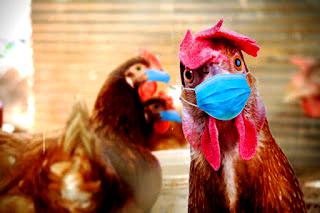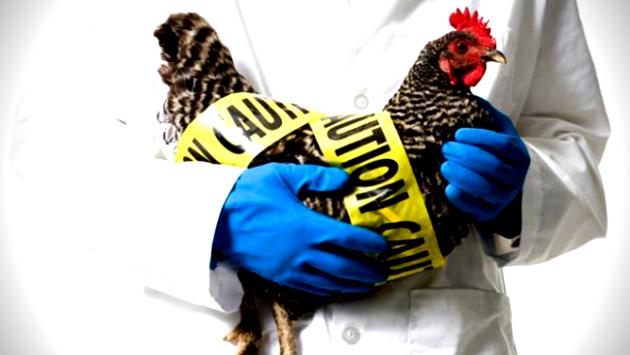Avian Flu Outbreak - What Does It Mean for Your Backyard Birds?
A severe strain of bird flu is spreading across the country this spring, affecting certain bird species more than others.
Birds can't seem to get a break. Last year, a mysterious disease killed thousands of songbirds in the eastern United States. Now, a particularly severe strain of bird flu virus (the cause of "bird flu") is spreading across the country. Avian influenza virus primarily infects birds and can be transmitted through contact with other birds or their droppings. This year, the virus has been found in more than 800 wild birds and 36 million domestic poultry in the United States. Although humans can be infected, this is rare. Only one human case has been confirmed to date from this outbreak. So what does this mean for backyard birds? Should you do something different to keep wild songbirds and pet chickens safe?
Need to download bird feeders and waterers?
Many of us enjoy seeing songbirds visit our feeders and drinkers. But one of the first questions we ask when a disease outbreak occurs is "should I download them?" It is possible. There are some mixed messages in the bird flu case.
The University of Minnesota Raptor Center and at least three states (Michigan, Illinois, and Montana) have recommended that the feeders be removed. However, other states did not follow the same path. And leading wild bird organizations, including Audubon and the Cornell Lab of Ornithology, haven't published comprehensive guidance stating that you should only follow your local agency recommendations. If you're confused about what to do, you're not the only one.
Bryan Richards, emerging disease coordinator at the USGS National Wildlife Health Center, helps clarify the situation. He says you can choose to "very carefully" lower your bird feeders and waterers. However, he notes that songbirds have a low risk of infection.
"The virus has significant effects on wild birds," says Richards. However, it primarily affects scavenger birds such as raptors, not waterfowl, shorebirds and songbirds. This year, two blue jays and 30 crows have tested positive for bird flu, making up a very small proportion of confirmed cases. During the last avian flu epidemic in 2014 and 2015, only one nightingale and one European starling tested positive.
So why aren't songbirds at high risk of contracting the virus? It all makes sense, Richards says, when you consider how the virus is transmitted. Waterfowl and shorebirds are natural hosts of the virus and pass the virus to each other by pooping in the water. When an infected waterfowl dies, a raptor can eat from it and become infected in the process. However, since none of these birds go to the feeders, songbirds attracted by the feeders do not come into contact with the virus much.
However, not every situation is the same. If you live next to a pond with geese and ducks, or near a large commercial poultry facility, "there may be a high risk" to birds visiting your feeders, Richards says. This is because living too close to high-risk birds makes it more likely for them to catch the virus from ducks, geese or chickens and then spread it to other songbirds in feeders.
But what about organizations and states that say to remove feeders until the virus passes? Richards notes that when you review their advice, they often present it as a warning approach as well. For example, Michigan told residents they "may want to very carefully remove" their bird feeders… but that's not a critical step yet.
If you decide to leave your feeders and drinkers outside, be sure to clean them regularly. “Even if [bird flu] transmission in this backyard feeder or drinker is a low-risk proposition, there are plenty of other pathogens,” says Richards. Regular cleaning of feeders and drinkers with a bleach solution "makes a lot of sense".
Should you be worried about the chickens in your backyard?
While songbirds have a low risk of infection, this is not the case for your backyard chickens. "The virus is infecting chickens very quickly," says Casey Ritz, professor and poultry extension specialist at the University of Georgia. Millions of domestic chickens have died from bird flu in the last few months. While most of the deaths occur in commercial facilities, backyard herds are also at risk.
“The first thing people notice is that their chickens look healthy one day and die en masse or die the next,” Ritz says. Infected chickens may also show a variety of other symptoms such as coughing and discolored snot and combs.
Ritz notes that "minimizing interaction with sick birds" and taking some basic biosecurity measures are crucial to keeping backyard flocks healthy. This means you shouldn't visit other flocks or share equipment with your chicken-feeding neighbor. When caring for your herd, wear a special pair of shoes and clothing. And if you want to bring home new chickens, be sure to buy them from an NPIP certified source; This,
Backyard birds bring so much joy. Especially for backyard chickens, it makes sense to take extra precautions while bird flu continues. It's always a good idea to clean feeders and drinkers regularly, so why not start this practice now? Just taking a few extra precautions can help keep bird flu at bay and keep our feathered friends healthy.

